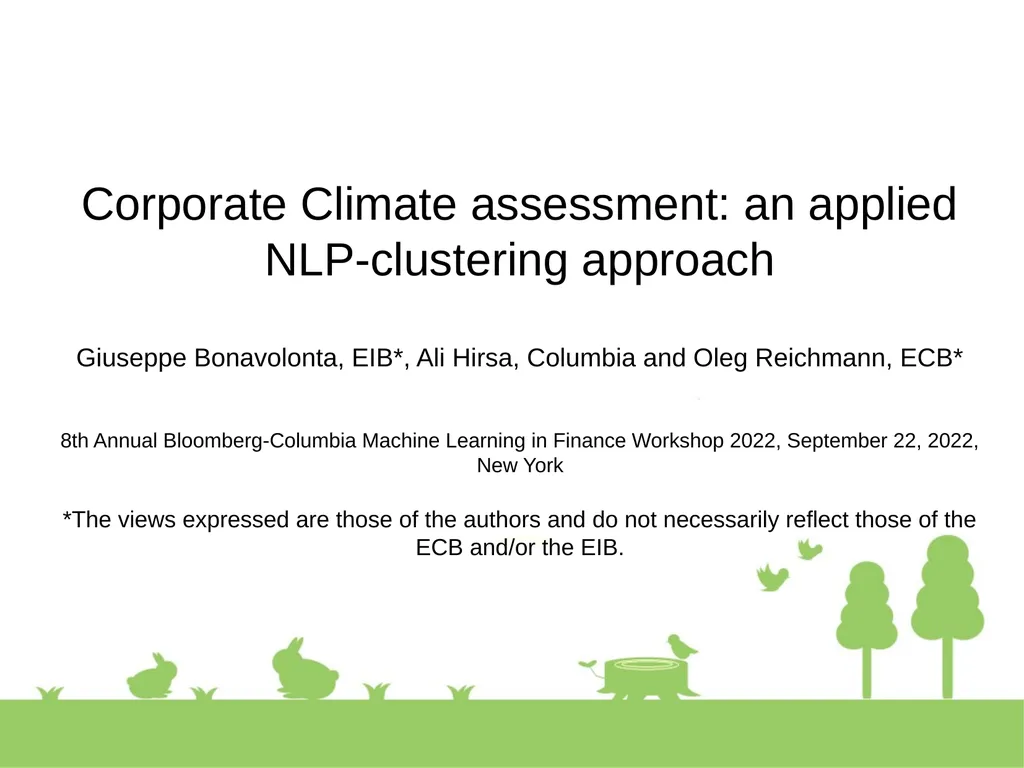Corporate Climate assessment: an applied
Author : calandra-battersby | Published Date : 2025-06-23
Description: Corporate Climate assessment an applied NLPclustering approach Giuseppe Bonavolonta EIB Ali Hirsa Columbia and Oleg Reichmann ECB 8th Annual BloombergColumbia Machine Learning in Finance Workshop 2022 September 22 2022 New York
Presentation Embed Code
Download Presentation
Download
Presentation The PPT/PDF document
"Corporate Climate assessment: an applied" is the property of its rightful owner.
Permission is granted to download and print the materials on this website for personal, non-commercial use only,
and to display it on your personal computer provided you do not modify the materials and that you retain all
copyright notices contained in the materials. By downloading content from our website, you accept the terms of
this agreement.
Transcript:Corporate Climate assessment: an applied:
Corporate Climate assessment: an applied NLP-clustering approach Giuseppe Bonavolonta, EIB*, Ali Hirsa, Columbia and Oleg Reichmann, ECB* 8th Annual Bloomberg-Columbia Machine Learning in Finance Workshop 2022, September 22, 2022, New York *The views expressed are those of the authors and do not necessarily reflect those of the ECB and/or the EIB. Agenda Part I: Background and Motivation Climate risk as financial risk Climate related disclosures Part II: NLP for corporate reports Representation based on topics BERT embedding Clustering and Numerical examples Background Background Conclusion. (IPCC 2013) It is extremely likely that more than half of the observed increase in global average surface temperature from 1951 to 2010 was caused by the anthropogenic increase in greenhouse gas concentrations[…] Background Physical risk Acute risk: Risks due to likelihood of more frequent and more severe occurrence of natural hazards (e.g. floods, storms). They represent the economic costs and financial losses due to increasing frequency and severity of climate-related weather events (e.g. storms, floods or heat waves). Background Physical risk Acute risk: Risks due to likelihood of more frequent and more severe occurrence of natural hazards (e.g. floods, storms). They represent the economic costs and financial losses due to increasing frequency and severity of climate-related weather events (e.g. storms, floods or heat waves). Chronic risk: Risks due to structural changes to the physical environment (e.g. reduction of perma-frost, sea-level rise, water scarcity, increase of the average temperature). They represent the effects of long-term changes in climate patterns (e.g. ocean acidification, rising sea levels or changes in precipitation). Background Transition risk Risks for the business model of counterparties due to the transition towards a low-carbon economy (e.g. triggered by governments, technological advancement, and/or changing customer preferences). Transition risks are associated with the uncertain financial impacts that could result from a rapid low-carbon transition, including policy changes, reputational impacts, technological breakthroughs or limitations, and shifts in market preferences and social norms. Climate risk as financial risk Source: BIS, Climate-related risk drivers and their transmission channels Climate risk as financial risk The EIB Group Climate Bank Roadmap 2021-2025 outlines group goals for climate finance that supports the European Green Deal and helps make Europe carbon-neutral by 2050. It maps the next stages in the journey to a sustainable planet and provides a framework to counter climate change. ECB launched a supervisory climate risk stress test to assess how prepared banks are for dealing with financial and economic














